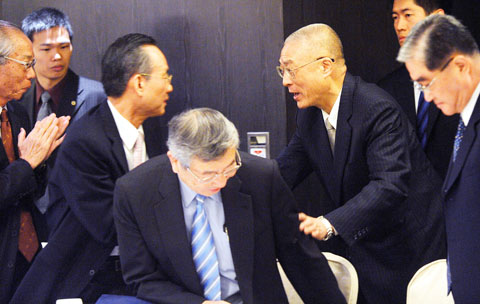Premier Wu Den-yih (吳敦義) yesterday denied speculation that Taiwan would allow Chinese banks to merge with or invest in Taiwanese banks or financial institutions.
Asked to comment on reports that Chinese banks would now be allowed to merge with Taiwan-based banks and financial institutions, Wu told the Taiwan Foreign Correspondents Club that this was not the case.
“So far, it is not the case that Chinese banks can buy Taiwanese banks,” Wu said.

PHOTO: CHIEN JUNG-FONG, TAIPEI TIMES
He said, however, that during talks on a proposed economic cooperation framework agreement (ECFA) between Taiwan and China, discussions could touch on allowing one or two Chinese banks to open branches in Taiwan.
“We might discuss one or two Chinese branches being able to establish themselves in Taiwan,” the premier said, “but there will be no discussions on acquiring Taiwanese banks.”
Wu, who emphasized that the administration would take a “step-by-step” approach to cross-strait agreements, said that an ECFA would not be discussed during the fourth round of talks between the Straits Exchange Foundation and China’s Association for Relations Across the Taiwan Strait in Taichung later this month.
Negotiations on an ECFA, he said, would start at the beginning of next year.
Minister of Economic Affairs Shih Yen-shiang (施顏祥) said later yesterday that the two sides would begin formal negotiations on an ECFA after the Lunar New Year, which falls in mid-February.
Earlier yesterday, Wu told representatives of the Chinese National Association of Industry and Commerce (CNAIC, 工商協進會) that Taiwan’s industrial development would be jeopardized without an ECFA in view of the threats posed by ASEAN Plus One.
With the ASEAN Plus One to take effect next year, the average export tariffs on Taiwanese goods to China will be 9 percent more than those of ASEAN countries — a disadvantage that could put companies off setting up production facilities in Taiwan, he said.
Taiwan will be further marginalized when a free-trade zone is formed among ASEAN with China, South Korea and Japan, he said.
CNAIC chairman Theodore Huang (黃茂雄) said that the government should allay companies’ skepticism on the potential impact of an ECFA and come up with plans to help affected industries.

PATENTS: MediaTek Inc said it would not comment on ongoing legal cases, but does not expect the legal action by Huawei to affect its business operations Smartphone integrated chips designer MediaTek Inc (聯發科) on Friday said that a lawsuit filed by Chinese smartphone brand Huawei Technologies Co (華為) over alleged patent infringements would have little impact on its operations. In an announcement posted on the Taiwan Stock Exchange, MediaTek said that it would not comment on an ongoing legal case. However, the company said that Huawei’s legal action would have little impact on its operations. MediaTek’s statement came after China-based PRIP Research said on Thursday that Huawei filed a lawsuit with a Chinese district court claiming that MediaTek infringed on its patents. The infringement mentioned in the lawsuit likely involved

Taipei is today suspending work, classes and its US$2.4 trillion stock market as Typhoon Gaemi approaches Taiwan with strong winds and heavy rain. The nation is not conducting securities, currency or fixed income trading, statements from its stock and currency exchanges said. Authorities had yesterday issued a warning that the storm could affect people on land and canceled some ship crossings and domestic flights. Taiwan Semiconductor Manufacturing Co (TSMC, 台積電) expects its local chipmaking fabs to maintain normal production, the company said in an e-mailed statement. The main chipmaker for Apple Inc and Nvidia Corp said it has activated routine typhoon alert

GROWTH: TSMC increased its projected revenue growth for this year to more than 25 percent, citing stronger-than-expected demand for AI devices and smartphones The Taiwan Institute of Economic Research (TIER, 台灣經濟研究院) yesterday raised its forecast for Taiwan’s GDP growth this year from 3.29 percent to 3.85 percent, as exports and private investment recovered faster than it predicted three months ago. The Taipei-based think tank also expects that Taiwan would see a 8.19 percent increase in exports this year, better than the 7.55 percent it projected in April, as US technology giants spent more money on artificial intelligence (AI) infrastructure and development. “There will be more AI servers going forward, but it remains to be seen if the momentum would extend to personal computers, smartphones and

Catastrophic computer outages caused by a software update from one company have once again exposed the dangers of global technological dependence on a handful of players, experts said on Friday. A flawed update sent out by the little-known security firm CrowdStrike Holdings Inc brought airlines, TV stations and myriad other aspects of daily life to a standstill. The outages affected companies or individuals that use CrowdStrike on the Microsoft Inc’s Windows platform. When they applied the update, the incompatible software crashed computers into a frozen state known as the “blue screen of death.” “Today CrowdStrike has become a household name, but not in